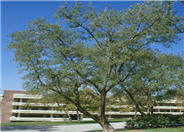
Common name:Olive
Botanical name:Olea europaea
This broad tree will grow to 40' tall and has small, gray green leaves with fleshy black fruit that appears in fall. Purchase fruitless varieties to avoid the mess.
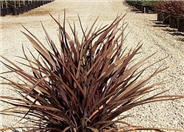
Common name:Amazing Red Flax
Botanical name:Phormium 'Amazing Red'
Phormium 'Amazing Red' is an evergreen perennial. It is a 2' tall, dramatic plant composed of many swordlike, stiffly vertical leaves in a fan pattern. Leaves are dark reddish brown in color.

Common name:Pygmy Date Palm, Roebelin Palm
Botanical name:Phoenix roebelenii
This tree will grow to about 10' tall and has dark green, spiny petiole foliage. It does well in full sun to heavy shade; it likes moderate to heavy irrigation, but can take periods of dryness.
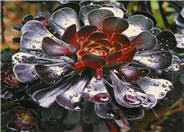
Common name:Purple Tree Aeonium
Botanical name:Aeonium arboreum 'Zwartkop'
Aeonium arboreum 'Zwartkop' is a succulent perennial that is used for accenting effect. Aeonium arboreum grows 3' tall and wide. Each branch has a 6"-8 " wide rosette of dark green, fleshy leaves.The flowers are yellow in clusters.
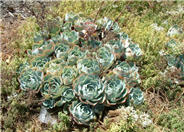
Common name:Hen and Chicks
Botanical name:Echeveria X 'Imbricata'
This succulent perennial is very small, growing only 2"-3" high. It produces orange, pink, and red blooms and does best in full sun and moist soil.
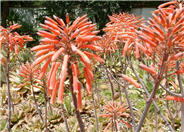
Common name:Shrimp Pink Aloe
Botanical name:Aloe maculata
This succulent plant will grow about 2' high and has large, greenish/white leaves with orange, pink, and red flowers that bloom in spring and fall.
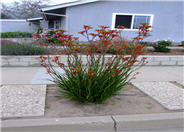
Common name:Red Cross Kangaroo Paws
Botanical name:Anigozanthos 'Red Cross'
Red Cross Kangaroo Paws has showy, tall (4'-5'), multi- branched stems with rich red color on both flowers and stems. The flowers have a green interior. It is fast growing.
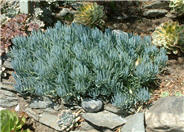
Common name:Kleinia
Botanical name:Senecio mandraliscae
This succulent perennial will grow to about 1.5' tall and 2' wide. It has curved, bluish gray leaves that are about 3.5" long and very slender.
| Designer: My Botanica | Front Yard Beauty |
Photographer: GardenSoft |
Soils and Compost:
Physical weed control, including mulching, or hand removal protects the watershed from harmful chemicals.
Water Saving Tip:
Mulching around plants helps retain water and improves the soil.
Integrated Pest Management:
Drip and other smart irrigation delivers water directly to roots, allowing no excess water for weeds.
